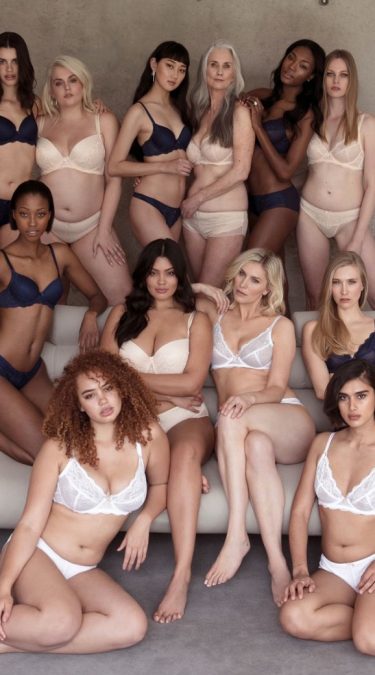
Boom and the bust!
07 July 2018
What a joy to see the Figleaves campaign. A simple message of diverse femininity - is good for business AND good for audience self esteem. And as the US brand Solid and Striped have learned, lack of it will land you with a shedload of digital derision as reported by cosmopolitan.com
Just back from Appearance Matters 8, the internationally renowned body image symposium held in Bath this year and hosted by the Centre of Appearance Research, discussion was of cosmetic surgery and the normalisation of the surgically created breast (amongst many other things).
Researching, in preparation for the panel I would chair, I noticed breast augmentation was also the number one procedure women chose and that women also underwent 91% of all cosmetic procedures in 2017 BAAPS
In the US according to ASPS, breast augmentation has risen 41% since 2000.
So can we link increased objectification and lack of diverse portrayal of women's bodies viewed through the lens of video, music, gaming, film, fashion and tv culture to body-image distress and the inevitable 'treatment,' seeking?
Most likely...But I jump the gun.
My panel guests were international scholar Heather Widdows - John Feguson Professor of Global Ethics, Barbara Lutz a private plastic surgeon, Christine Mozzamdar - Head of Operations of the Transform Group, Nigel Mercer, President of the Federation of Specialist Surgical Associations and Katharine Wright Assistant director of the Nuffield Council on Bioethics. And with a room full of psychologists, academics and body image professionals, we navigated the difficult space that is coercive messaging from mass-media aimed at women to create consumer desire (amongst women) for a boom in breast surgery.
At this stage one can dream and we did, encouraged by Prof Heather Widdows... what if women were not subject to unreasonable cultural pressures to present a perfected and sexualised physical self? And what if all advertising took a more informed approach to their audience selfhood and mental health. (Thanks again Figleaves - showing this campaign to my daughters so they can switch to your site for future purchases).
And then there is the big one to ponder! What if girls were free to engage in celebration of selfhood in the way that boys and men take for granted? Gender privilege means that surgery can be marketed as a 'take-control,' tool to female consumers. Yet while this sticking-plaster for the wound that is sexism, fuels both a boom in self-elected surgical procedure and industry growth, do we have any real evidence that the promise of confidence and self-esteem many seek, will actually follow?
Not really.
As surgeon Barbara Lutz reported very succinctly, "I'm compelled to tell her I cannot make her happy, I can only change the shape of her breasts." But yet the image of serene and beautiful woman adorns the brochure claim doesn't it?
Perhaps a variety of longtitudinal studies to investigate the marketing claims of an industry that uses 'confidence,' as a recruitment gambit could be in order?
But as former director for the Centre of Appearance Research, Professor Nichola Rumsey OBE would point out as the discussion drew to a close, request for access by psychologists, to patients before and after surgery - to study the reality of breast surgery and its effects upon the mental health of the woman herself, has been repeatedly waived aside by the cosmetic surgery industry.
We can only draw our own conclusions from this.
